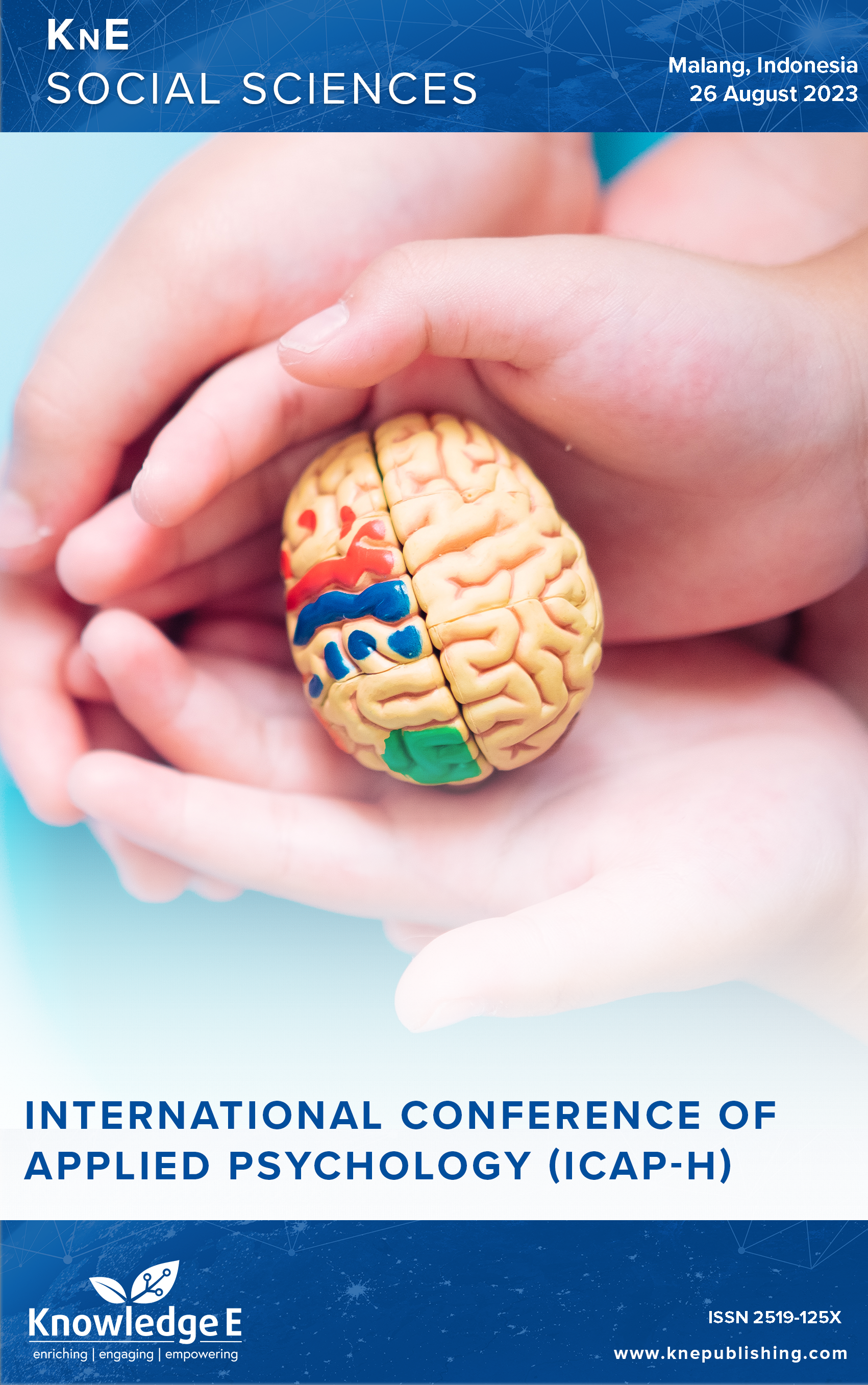How can Women Working in Mining Achieve a Flourishing Life
DOI:
https://doi.org/10.18502/kss.v9i5.15157Abstract
Mining is a high-risk field of work, especially for women. A work environment that is prone to accidents is the basis for the application of strict work rules. This risk causes concern and has an impact on the individual’s process of achieving a flourishing life. Although, individual personality considerations also play a role in achieving flourishing. This study aims to determine the relationship between the big five personalities and development. This research is nonexperimental quantitative research with a correlational approach. The research respondents were 32 female employees who worked in the mining company. The age of the respondents was in the range of 20–54 years. The majority of respondents had a bachelor’s degree. As many as 68.75% of employees work in the office and 31.25% work in the field. The scale used is the Ten-Item Personality Inventory (TIPI) and the Flourishing Scale (FS). The analysis was performed with multiple linear regression. The results showed that big five personalities simultaneously does not affect flourishing (R = 0.515; P > 0.05). However, partially agreeableness and conscientiousness influence flourishing (R = 0.493; P < 0.05). That is, women who work in mining with agreeableness and conscientiousness tend to flourish more easily than extraversion, emotional stability, and openness to experience. However, the personalities of the big five were not an important consideration in achieveing a flourish life for women who work in mining company.
Keywords: big five personalities, flourishing, mining female employees
References
Ward RM, Popson HC, DiPaolo DG. Defining the alpha female: A female leadership measure. Journal of Leadership & Organizational Studies. 2010;17(3):309–320. DOI: https://doi.org/10.1177/1548051810368681
Masturah AN. Gambaran konsep diri mahasiswa ditinjau dari perspektif budaya. Indig J Ilm Psikol. 2017;2(2). DOI: https://doi.org/10.23917/indigenous.v2i2.4934
American Psychological Association. High-risk jobs and high risk populations. American Psychological Association; 2011.
Jimenez P, Dunkl A. The buffering effect of workplace resources on the relationship between the areas of worklife and burnout. Frontiers in Psychology. 2017;8(12):1–10. DOI: https://doi.org/10.3389/fpsyg.2017.00012
Juliana M, Camelia A, Rahmiwati A. Analisis faktor risiko kelelahan kerja pada karyawan bagian produksi PT. Arwana anugrah keramik, tbk. J Ilmu Kesehat Masy. 2018;9(1):53–63. DOI: https://doi.org/10.26553/jikm.2018.9.1.53-63
Effendy N, Subandriyo H. Tingkat flourishing individu dalam organisasi PT X dan PT Y. EXPERIENTIA : Jurnal Psikologi Indonesia. 2017;5(1):1–17.
Masturah AN. Social support for being flourish on adult. In: Proceeding of 1st International Conference on Education and Psychology [ICEDUPSY]. Malang: University of Muhammadiyah Malang; 2021.
Diener E, Wirtz D, Tov W, Kim-Prieto C, Choi D, Oishi S, et al. New well-being measures: Short scales to assess flourishing and positive and negative feelings. Social Indicators Research. 2010;97(2):143–156. DOI: https://doi.org/10.1007/s11205-009-9493-y
Masturah AN, Hudaniah H. Efikasi diri dan dukungan sosial sebagai prediktor flourishing pada dewasa awal. Jurnal Ilmiah Psikomuda. 2022;2(1):10–18. DOI: https://doi.org/10.58526/ez-sci-bin.v1i2.15
Seligman MEP, Steen TA, Park N, Peterson C. Positive psychology progress: Empirical validation of interventions. American Psychologist. 2005;60(5):410–421. DOI: https://doi.org/10.1037/0003-066X.60.5.410
Akhtar H. Translation and validation of the Ten-Item Personality Inventory [TIPI] into Bahasa Indonesia. International Journal of Psychological Research. 2018;7(2):59–69. DOI: https://doi.org/10.5861/ijrsp.2018.3009
Bedaso TS, Han B. Attitude toward aging mediates the relationship between personality and mental health in older adults. Healthcare. 2021;9(5). DOI: https://doi.org/10.3390/healthcare9050594
Brailovskaia J, Margraf J. What does media use reveal about personality and mental health? An exploratory investigation among German students. PLoS One. 2018;13(1):1–16. DOI: https://doi.org/10.1371/journal.pone.0191810
Bucher MA, Suzuki T, Samuel DB. A meta-analytic review of personality traits and their associations with mental health treatment outcomes. Clinical Psychology Review. 2019;70:51–63. DOI: https://doi.org/10.1016/j.cpr.2019.04.002
Zhang L, Lu H, Li F. Proactive personality and mental health: The role of job crafting. PsyCh Journal. 2018;7(3):154–155. DOI: https://doi.org/10.1002/pchj.214
Umukoro J, Egwakhe J, Akpa V. Flexible wellbeing and organizational creativity: Personality traits role. Bus Theory Pract. 2021;22(2):370–379. DOI: https://doi.org/10.3846/btp.2021.12330
Daigle É, Guitard J, Roy-Charland A. Exploration of the flourishing scale’s psychometric properties for French-Canadians and its relationship with hexaco personality traits. Canadian Journal of Behavioural Science. 2022;54(1):79–84. DOI: https://doi.org/10.1037/cbs0000288
HalilEksi IbrahimAlbayrak, FüsunEksi I. International Journal of Psychology and Educational Studies. Journal. 2022;9(2):353–367. DOI: https://doi.org/10.52380/ijpes.2022.9.2.534
MacIntyre PD, Ross J, Talbot K, Mercer S, Gregersen T, Banga CA. Stressors, personality and wellbeing among language teachers. System. 2019;82:26–38. DOI: https://doi.org/10.1016/j.system.2019.02.013
Umucu E, Grenawalt TA, Reyes A, Tansey T, Brooks J, Lee B, et al. Flourishing in student veterans with and without service-connected disability: Psychometric validation of the flourishing scale and exploration of its relationships with personality and disability. Rehabilitation Counseling Bulletin. 2018;63(1):3–12. DOI: https://doi.org/10.1177/0034355218808061
Masturah AN. Personality and positive emotion of student. In: Proceedings of International Conference Asian Association of Indigenous and Cultural Psychology [AAICP]. Sabah: Universiti Malaysia Sabah; 2018. 767–772 p.

